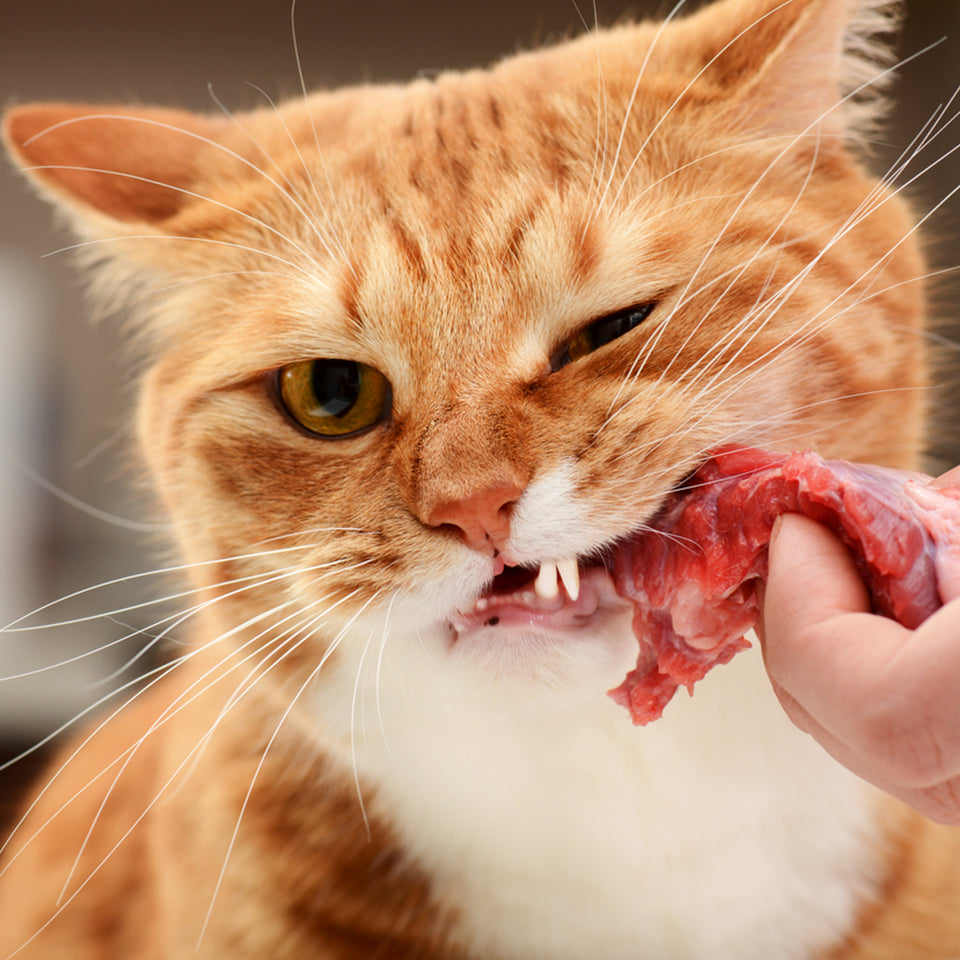Cats are unique in more ways than one and that is especially true when it comes to their nutritional requirements and digestive health. Felines evolved as hunters that consumed preys containing high amount of proteins, with a moderate amount of fat and a minimal amount of carbohydrates.
This is why one of the most important and essential dietary component for these animals is protein.
Cats are obligate carnivores:
Domestic cats are very similar to their wild predecessors and have evolved very little from them. Unlike dogs, which are omnivores, cats are obligate carnivores.
What is an obligate carnivore?
An obligate carnivore is a predator that eats meat out of biological necessity. As a result of their traditional diet throughout evolution, these animals may be unable to synthesize necessary nutrients from plant matter. This causes them to rely on other animals to provide them with vitamins, fatty acids, and other nutrients in a pre-formed state.
Cats have adapted physiologically to the life of a hunter:
Have you ever wondered why do cats have sharp teeth? Well, they use their serrated molars to shear muscle and connective tissue off the bones and cut them up into chunks they can swallow whole. In addition to that, their scissor-like carnassial teeth are ideal for delivering the cervical bite used to severe the spinal cord and immobilize or kill the prey. Therefore, their teeth evolved for slicing rather than chewing. As a result, when cats eat, they swallow the meat in chunks and take longer to process it.
Plant vs. Animal Protein
Amino acids are the monomers that make up proteins, which are necessary for building and repairing tissues, production of enzymes, hormones, antibodies and for the transport of energy. Proteins are then broken down into amino acids, which are used for energy or for the formation of new proteins. Cats have 20 amino acids in their bodies and 11 of these are considered essential amino acids. Having an insufficient level of any one these can cause health problems.
- Arginine
- Histidine
- Isoleucine
- Leucine
- Lysine
- Methionine
- Phenylalanine
- Taurine
- Threonine
- Tryptophan
- Valine
These essential amino acids, as well as other essential nutrients for cats, are best supplied by meat and other animal tissues.

But why do cats need meat in their diet?
#1: Cats can’t be vegetarians
Cats can’t digest carbohydrates (major components of plant tissue). But why is that?
- Cats have lower concentrations of other carbohydrate-digesting enzymes in their intestines compared to dogs.
- Cats lack amylase, the enzyme that starts carb digestion, in their saliva.
- Cats lack a key liver enzyme, glucokinase, which is responsible for converting glucose into a form that cells can use to make energy when the liver receives a large amount of glucose.
Cats’ most important source of energy is protein. With only foods based on plant matter, it will either have a high carbohydrate concentration, or will lack amino acids necessary for feline health.
Unlike other species, a cat’s liver enzymes are constantly breaking down proteins for energy and maintenance of blood glucose levels. When cats do not receive enough dietary protein, especially when they’re fed a plant-based diet and when other sources of energy, such as carbohydrates, are present, their bodies start breaking down their own muscle tissue to meet their protein and amino acid requirements in a process called gluconeogenesis*
Gluconeogenesis*: Gluconeogenesis refers to synthesis of new glucose from noncarbohydrate precursors, provides glucose when dietary intake is insufficient or absent
#2: Cats can’t produce all their own nutrients
Meat contains several vitamins and amino acids that cats need to survive, as they can’t produce them on their own. These nutrients include:
- Vitamin A — Is essential for night vision, healthy skin, and supports the immune system of cats. Without adequate vitamin A levels, your cat can become blind.
- Arginine — Cats cannot produce arginine, an amino acid that is an essential building block for protein on their own. Arginine deficiencies can lead to excessive amounts of ammonia, which can cause drooling, lethargy, vomiting and neurologic symptoms that may quickly lead to seizures and death.
- Taurine — Taurine is an amino acid that is particularly important to eye and heart health. It is also necessary for normal reproduction and kitten growth.
Although cats can synthesize small amounts of taurine, they are not able to produce as much as their bodies need.
In the absence of taurine, cats may suffer from blindness due to central retinal degeneration, heart failure from dilated cardiomyopathy, reproductive failure, and/or developmental abnormalities of the central nervous system.
#3: The digestive tract is shorter in cats than in most mammals
Since gut bacteria take longer to break down plant material, plant eaters normally have longer digestive tracts. Because cats eat meat which is more rapidly digested compared to plants, they have much shorter digestive tracts, making them unable to be fed a diet high in plant matter.


